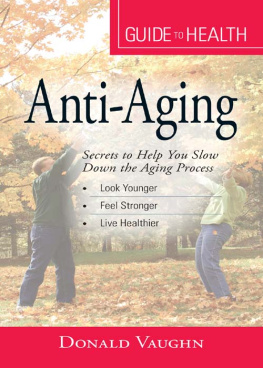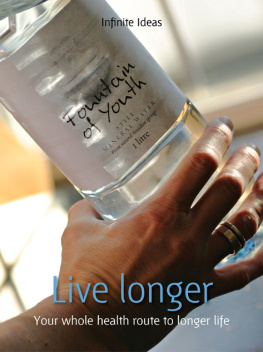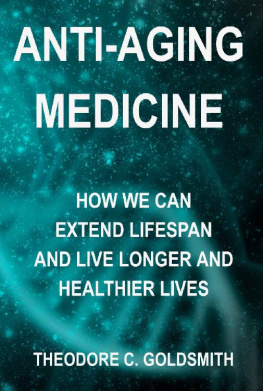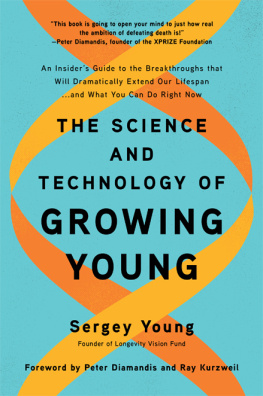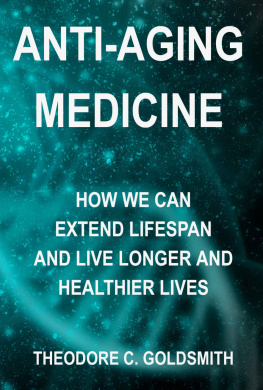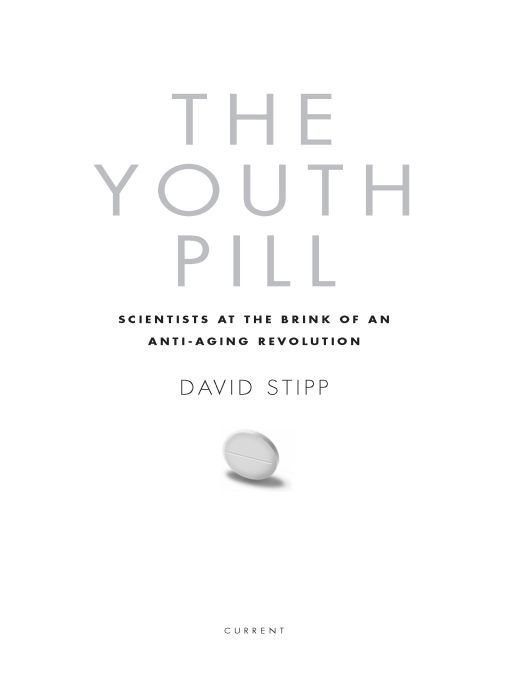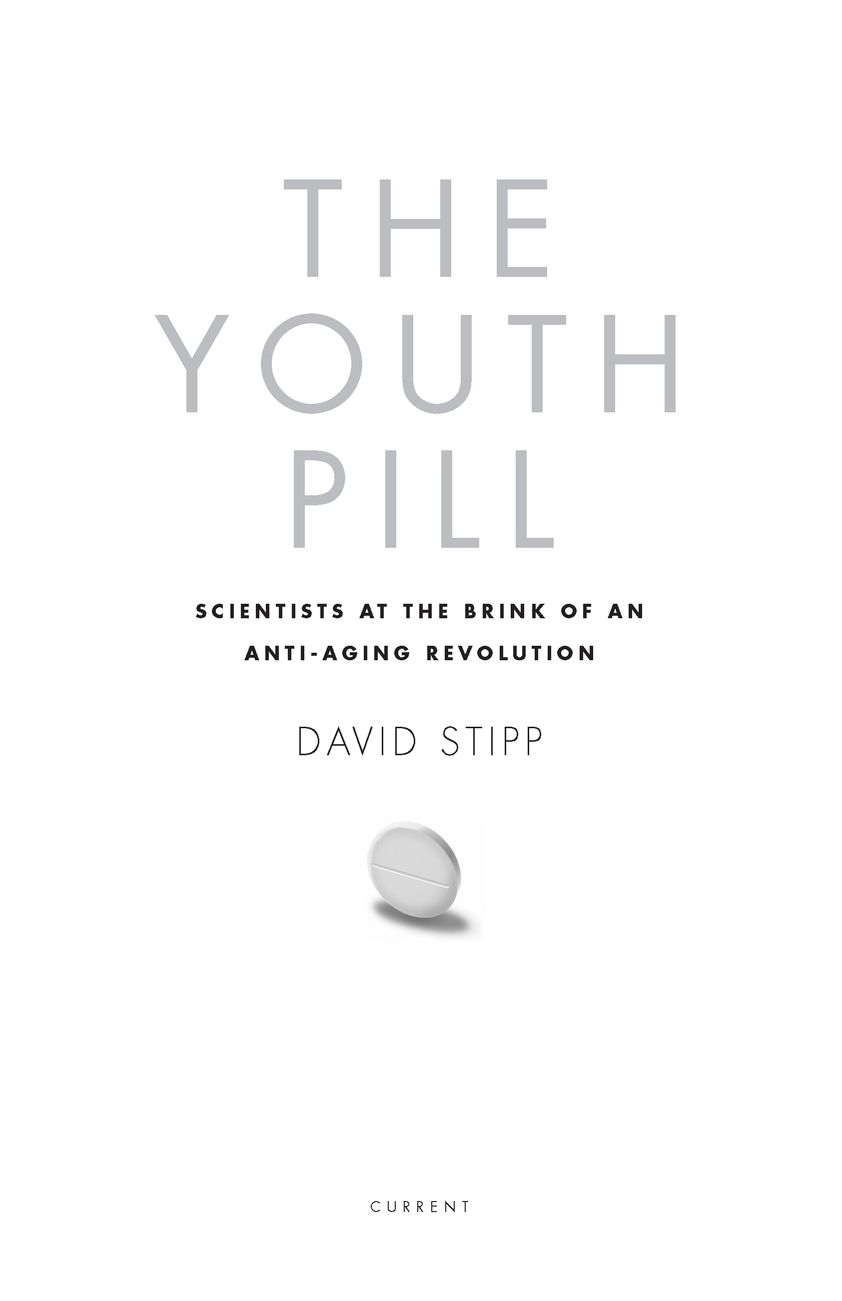Table of Contents
To Alicia
The idea is to die young as late as possible.
ASHLEY MONTAGU (1905-1999)
PROLOGUE
THE MOUSE STUDY THAT ROARED
A FEW HOURS before one of the biggest medical stories of 2006 broke, David Sinclair, the man who initiated the research, was addressing about half a million people from the drivers seat of his Honda Accorda Financial Times reporter was interviewing him via a speakerphone in the car for a story that would run the next day. It was 8:15 A.M. on a freakishly balmy November day in Boston, and the Harvard Medical School scientist was in his many-armed- deity mode, dodging and weaving through rush-hour traffic, sipping his second tall black coffee of the day, stealing glances at incoming e-mail on his handheld Treo, and, in a routine hed repeated so many times it was almost effortless, supplying the reporter with hooks to snag even the most science-shy readers. As usual during his morning commute, it occurred to Sinclair that the Riverway, a winding parkway he took to work, was a bad place for mobile multitaskingtoo many close-packed commuters veering hell-for-leather around tree-lined curves. But the thought quickly disappeared over his mental horizon. Those of many arms dont wrap cars around trees. Besides, he had to stay focused.
Sinclair finished the interview while pulling into a parking lot at the New Research Building, a glass tower grafted into Harvards venerable med-school campus like a titanium implant in an octogenarians hip. After gulping the last of his coffee, he dropped the paper cup on his car floor, where it joined a dozen others, hurried up to his ninth-floor lab, and stepped onto the runaway tilt-a-whirl of a Warholian fifteen minutes of fame.
Since getting to work at 6:30, Susan DeStefano, the Sinclair labs unflappable coordinator, had continually updated her bosss schedule for the day as reporter after reporter called to plead for interviews. European media would get callbacks first because deadlines were already looming across the Atlantic. As Sinclair began reeling off sound bites over the phone, DeStefano handed him a cup of his favorite Italian roast. It turned out to be his last coffee of the day, leaving him three cups short of his usual intake. He wound up doing back-to-back interviews and photo shoots for the next nine hours straight, surfacing late in the day to realize with surprise that he had been going nonstop without his customary caffeine jolts, much less anything to eat.
There was some comic relief during the maelstrom. At an afternoon photo shoot for the New York Times, Sinclair found himself trying to look appropriately Harvardish while two lab mice that the photographer had asked him to pose with had scurried up his arm and tried to hide inside his shirt collar. As he later rushed into a Boston TV studio to appear on The Charlie Rose Show, DeStefano, who was right behind him, noticed that Sinclairs spiky hair was sticking out like a horizontal cowlick. Frantically improvising, she spit on her hand and smoothed down the mischievous sprig. Somehow it stayed.
The study that caused the ruckus, published that day by the journal Nature, wasnt at first glance the kind of biomedical starburst that flings front-page headlines across the globe. Its pedestrian title, Resveratrol Improves Health and Survival of Mice on High-Fat Diets, suggested a minor finding that might, on a slow news day, generate blurbs in a few newspapers. Its subjects were only rodents, so the implications for human health were still iffy. And what was resveratrol anyway, a new diet pill whose name was a mangled pun on reverse-it-all?
But something so remarkable had happened to the studys mice that even the medias gruffest gatekeepers were compelled to suspend disbelief about its newsworthiness. Daily doses of resveratrol, a compound found in red wine, had rendered the rodents largely immune to fallout from devastatingly rich diets theyd been given during the study, suggesting that the compound might be highly effective at fending off the array of life-shortening ills coming at us during the era of epidemic obesity. Even more arresting, the animals had shown amazingly youthful vigor as they had aged, as if their fundamental life force had been strengthened and their aging process slowed down.
I was one of the first outsiders to hear about the studyas a medical reporter at the Wall Street Journal and Fortune over the previous two decades, Id gotten hooked on aging science and followed it more closely than any other topic I covered. Sinclair was one of the researchers on aging I often talked to, and months earlier hed told me his group was beginning to see interesting effects in mice on resveratrol. Given all the similar claims that have led nowhere, I generally have only one question about the discovery of interventions that purportedly extend life span: Why should I buy this? The answers rarely whet my appetite to hear more. But the resveratrol study had more going for it than any revelation of anti-aging effects Id seen.
First, the work was blessed by Nature, widely regarded as the worlds top science journal, and its authors worked at prestigious institutions. While Sinclair had commercial ties, the study hadnt received corporate funding and was largely conducted by researchers at the National Institute on Aging. Further, resveratrol had previously been reported to extend life span in yeast, flies, worms, and fishno other compound had shown anti-aging effects in such a diverse array of species. Perhaps most important, there was growing evidence that resveratrol mimics effects of calorie restriction, or CR, a curtailment of food intake that had been known for more than seventy years to extend life span in animals. That offered a plausible explanation for its apparent anti-aging effects and tied the studys results to firmly established prior research.
As the study progressed, the preliminary data it generated seemed ever more intriguing. Several months before the Nature report was published, I visited the federal lab in Baltimore where the resveratrol-dosed rodents were keptI wanted to see for myself the remarkable effects Sinclair had told me about. After watching elderly mice on resveratrol perform like rodent Olympians in an endurance test, I came away convinced that the long, weird quest to extend life spana five-thousand-year trek during which hopelessly hopeful seekers tried everything from transfusing blood from youths into their aged veins to injecting minced dog testicleswas finally getting somewhere. It also struck me that substances capable of inducing CRs effects wouldnt simply prolong a miserable old agethey would probably buy us quality time.
Inevitably, there were caveats, complexities, and questions. The mice had been given huge doses of resveratrol. A person attempting to get a comparable dose would need to knock back whole cases of wine a day. And there was no guarantee that resveratrol would have anti-aging effects in peoplethe provocative discovery might lead to nothing more than pep pills for bloated rodents.
Still, it was the mouse study that roared. Weeks before it was published, reporters with the New York Times and other news outlets got wind of its findings and called Sinclair to ask about it. A few days before it was widely reported, Natures editors, realizing they had a hot paper in their hands, alerted media outlets that they would unveil the study online almost two weeks before it appeared in the British science journals print version. Soon after, Sinclair found himself dealing with the kind of early morning calls that newly anointed Nobel laureates wake up to. One eager reporter called him just after seven A.M., when, as usual, the Harvard scientist was overseeing his toddler daughters breakfast after his wife left for work. Acutely aware of the medias short attention span, Sinclair assured the importunate writer that okay, sure, it was a fine time to talk. In a minor stroke of genius, he kept the kids somewhat quiet during the interview by plying them with hastily slapped-together Nutella sandwiches. To the girls, Sinclairs big new thing was redolent of the chocolaty spread. For their dad, it had the even sweeter smell of vindication.


